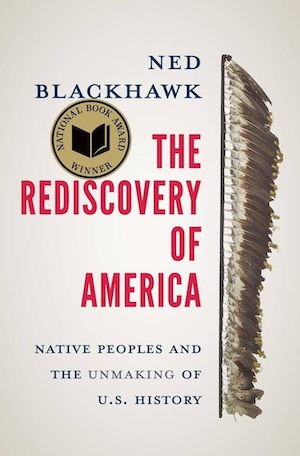By Allen D. Boyer
Shortlisted for ΦBK’s 2024 Ralph Waldo Emerson Award
“U.S. history as we currently know it does not account for the centrality of Native Americans,” Ned Blackhawk declares. “Pervasive violence and dispossession are more than sidebars or parentheses in the story of American history . . . . The exclusion of Native Americans was codified in the Constitution, maintained throughout the antebellum era, and legislated into the twentieth century: far from being incidental, it enabled the development of the United States.”
Like a rising generation of British Commonwealth historians, who have written of the British Empire from an Asian or African perspective, Blackhawk sees the United States as a nation of “settler colonialism.” In a similar vein, the constitutional scholar Aziz Rana has recently argued that the United States Constitution long provided the framework for the expansion of white rule.
Blackhawk has taken on a broader challenge. In The Rediscovery of America: Native Peoples and the Unmaking of U.S. History, a magisterial study honored with a National Book Award, Blackhawk argues for a new understanding of the history of relations between white governments and Indian nations—and, beyond that, of the culture in which American Indian law and policy evolved.
The Constitution mentions Indians only twice: once to exclude Indians from the population counted for taxation and representation, again to provide that Congress should regulate commerce with Indian tribes. Under the Articles of Confederation, such sovereign powers had belonged to the nation’s new states. Behind this lay the recognition, Blackhawk notes, that the new nation could neither win a war with Indian powers nor control the white settlers who were flooding into Indian lands.
George Washington, a veteran of the frontier, understood that federal action was needed to deal with Indian governments and to curb settler lawlessness. The government could deal with tribes; it failed for a century, and more, to deal with frontier settlers.
This represents a central thesis of Blackhawk’s book; this is why so detailed, comprehensive, and monumental a work so often sounds radical and partisan. Blackhawk argues that the history of the United States and its Indian nations was determined not so much by government policy as by what white Americans believed. The destruction of Indian tribes was not simply a matter of military action, economic coercion, and the government’s failure to honor treaties. White settlers, more than white authorities, destroyed Indian power. They claimed the continent because white culture taught them that they should have it. Throughout, Blackhawk pointedly writes, Indians “remained members of a ‘vanishing’ race in need of reform.”
This mindset began with the Puritan vision of the Bay Colony as a divinely sanctioned “city upon a hill”—when, more realistically, Plymouth and Boston were white settlements founded amid the detritus of an epidemic that had ravaged the Pawtuxet and Wampanoag peoples. It stood behind the slogan of Manifest Destiny. It was articulated by Francis Parkman and Frederick Jackson Turner, who saw Indian tribes as obstacles in the way of the frontiersman. It held sway as late as World War II and the Cold War, when Hollywood Westerns reduced Indians to grunting, whooping, drum-beating stereotypes, and Congress readily appropriated Indian land to house Japanese internees and build nuclear weapons.
For a book that ranges across five centuries and a continent, this history is remarkably even-handed and judicious. One slight imbalance may be detected. In dealing with a broad swathe of northern territory, an arc that sweeps from New England to the Pacific Coast, this book is particularly strong. More could be said, however, about Indian Territory and the checkered history of the Five Civilized Tribes who were resettled there. Decisions from Oklahoma have redefined “Indian country,” reviving Indian authority over tribal members and territory. (On this, By the Fire We Carry: The Generations-Long Fight for Justice on Native Land, by Rebecca Nagle, offers a very recent update.)
In recent decades, the Supreme Court has issued rulings that have revived Indian rights and power. The Court has repeatedly reiterated that tribes are sovereign entities, whose powers existed before white settlement and have never lapsed. Other decisions have swept state law from reservation lands, so that tribal councils can levy taxes and set up their own courts. In such rulings can be seen a regulation of commerce with Indian nations and a long-awaited reining-in of settler power. Ironically, and fittingly, the rediscovery of America may yield what the Founding Fathers anticipated.
Allen D. Boyer (ΦBK, Vanderbilt University) grew up on land ceded by the Chickasaw Nation and writes on land deeded by the Lenape to the English in April 1670. Vanderbilt University is home to the Alpha of Tennessee Chapter of Phi Beta Kappa.




